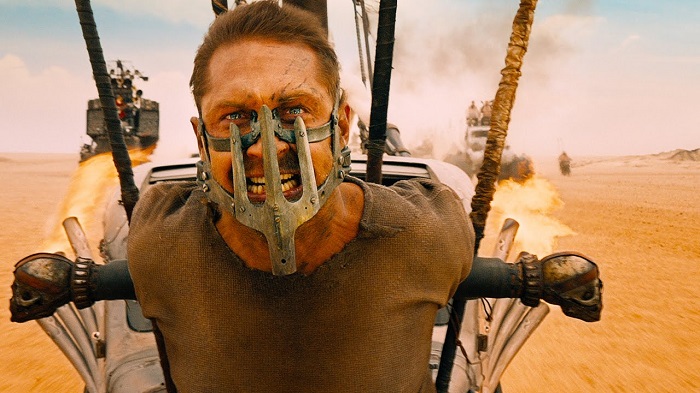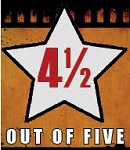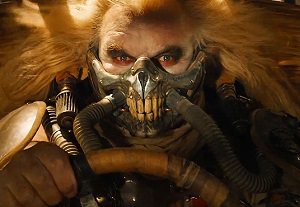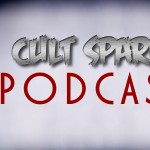

I'm not exactly sure how this happened. Mad Max: Fury Road is an improbable $150-million revival of an action series that had its heyday thirty years ago with a different actor playing its lead character. Its director, George Miller, is 70 years old, an age by which diminishing returns have long set in for almost every director not named Scorsese. Not to mention that fact that he's spent the last 20 years making movies for kids. But some studio exec somewhere must really love The Road Warrior (as we all do), and Miller got the chance to revisit the universe he created and attempt to make it relevant again for the modern movie-goer. The endeavor proving worthwhile seemed like a long-shot. Even I was skeptical.
Well, that skepticism is now laying bruised and bloody along the side of some ancient dusty highway. Mad Max: Fury Road is a juggernaut. It's a two-hour assault on the senses that leaves you exhausted from head to toe but also so completely thrilled that you want to step off the coaster and get right back in line to ride again. Starring Tom Hardy in the titular role previously played by Mel Gibson, Fury Road isn't quite a reboot, nor is it exactly a straight sequel. It's a slight variation on a theme, a modern interpretation of a world that will feel very familiar to anyone who loves the original Mad Max trilogy. And it is a fucking blast.
 Following a short prologue that re-establishes both Max and his incredibly shitty (and somewhat disturbing) post-apocalyptic universe, Fury Road quickly becomes a two-hour chase film that barely leaves you time to breathe. Max is a prisoner of Immortan Joe (Hugh Keays-Byrne), a white-haired, skull-masked despot who uses his control over a supply of fresh water (a rare commodity in the Max-verse) to rule over a large swath of the barren wasteland. One of his lieutenants is the hard-driving Furiosa (Charlize Theron), who's tasked with making a supply run to a nearby settlement. Instead, Furiosa goes rogue by smuggling Joe's five wives — sex slaves used exclusively for breeding — out of his home base and attempting to escape across the desert to a mythic land known as the "green place." Enraged, Joe sends an armada of "War Boys" after her, with Max along for the ride. (His universal blood type can come in handy.) It's not hard to figure that Max will eventually escape and that, once he does, he and Furiosa will team up to save the women and fight back at Joe and his army.
Following a short prologue that re-establishes both Max and his incredibly shitty (and somewhat disturbing) post-apocalyptic universe, Fury Road quickly becomes a two-hour chase film that barely leaves you time to breathe. Max is a prisoner of Immortan Joe (Hugh Keays-Byrne), a white-haired, skull-masked despot who uses his control over a supply of fresh water (a rare commodity in the Max-verse) to rule over a large swath of the barren wasteland. One of his lieutenants is the hard-driving Furiosa (Charlize Theron), who's tasked with making a supply run to a nearby settlement. Instead, Furiosa goes rogue by smuggling Joe's five wives — sex slaves used exclusively for breeding — out of his home base and attempting to escape across the desert to a mythic land known as the "green place." Enraged, Joe sends an armada of "War Boys" after her, with Max along for the ride. (His universal blood type can come in handy.) It's not hard to figure that Max will eventually escape and that, once he does, he and Furiosa will team up to save the women and fight back at Joe and his army.
But neither the predictability or simplicity of the plot is of any concern. What is important is the unparalleled style involved in telling the story. Fury Road is pure cinema spectacle. It's not overly gory, but it is intense in a way few action films are these days. Using a combination of practical and CG effects, Miller fills the screen with insanely modded-out vehicles occupied by a never-ending stream of bizarre yet colorful characters. Then he smashes these cars together like the most gleeful nine-year-old in the world. There are high-speed shootouts and fights that occur both on top and along the sides of souped-up war machines. There are massive sand-tornadoes that send bad guys flying through the air to their doom. There is fire and smoke and a masked, harnessed man riding a truck loaded with massive amplifiers whose sole job is to blast power chords across the wasteland as Joe's army closes in on its prey. (Guitar man is awesome.) It is excess, no doubt, but excess of a most glorious kind.
With all the craziness, there's not a lot of room for honest-to-god acting, but Hardy and Theron are both finely suited for the roles they play. By which I mean they're complete and total badasses. Furiosa, an amputee, sports a cool mechanical arm that looks entirely like a practical effect, even though I'm confident Theron still has both of her arms in real life. Co-leads in every sense, Theron's Furiosa drives the plot of the film while Hardy's Max provides its soul. His eyes are weary at the start, hinting at rough adventures past, and he's tortured by visions of those he's lost in this horrible world. (Fury Road's Max, despite having only a handful of lines of dialogue, might be the "maddest" version of the character we've seen yet.) Meanwhile, Nicholas Hoult is unrecognizable as an impassioned War Boy whose destiny will surprise him, while the beautiful actresses playing the oftentimes stoic five wives stand in stark contrast to the mutated cretins who populate Joe's army.
This movie will not be for everyone. It's weird and dark and crazy. But I can't imagine anyone who reads this site regularly not falling head over heels in love with it for exactly those reasons. Miller hasn't had to neuter or revise his original vision to meet any kind of modern-day standards. He merely creates a fresh version of it, pure and full of energy and heart. It would be a staggering achievement for any filmmaker, let alone a 70-year-old director trying to recreate successes past. And while there have been other franchise films that have tried and failed miserably to recapture the magic after so much elapsed time off — I'm looking at you Kingdom of the Crystal Skull — Fury Road proves it can be done in a fashion that feels respectful of what's come before while still blazing new cinematic ground. Even the 3D, which I normally loathe, really worked with the film's hyper-stylized environments. This is your first must-see movie of 2015. Miss it on the big screen at your own risk.











